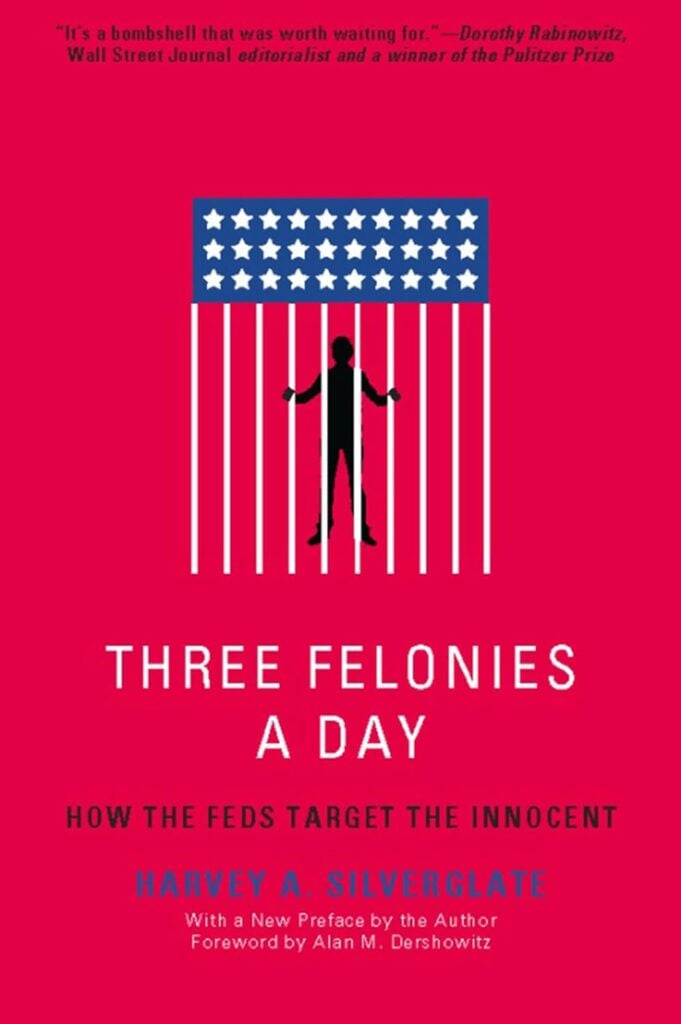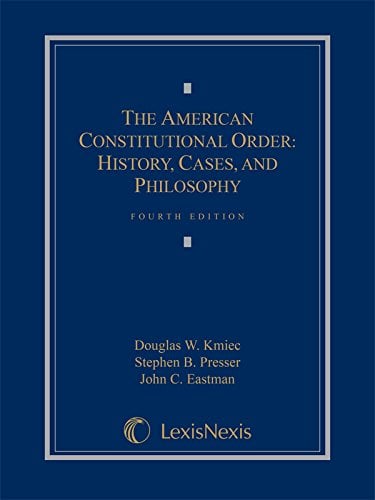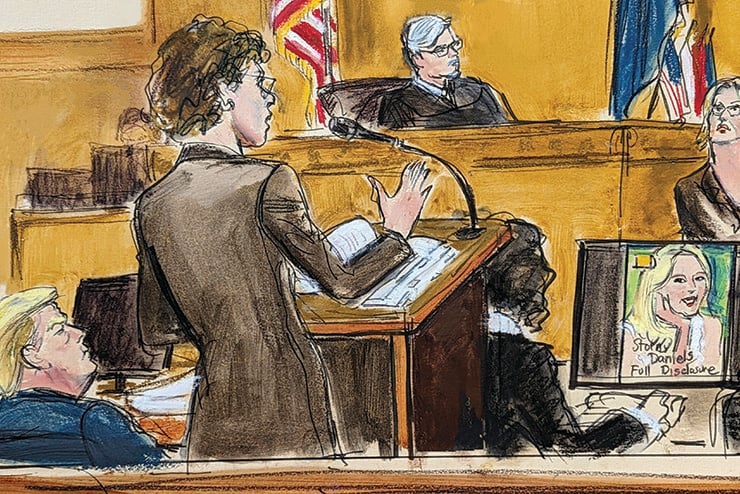In America, the rule of law has been replaced by the rule of lawfare, in which “justice” is simply the will of the stronger.
The consensus of the commentators, especially on the right, was that the rule of law expired in America on May 30, 2024, when a New York jury found Donald Trump guilty of 34 felonies.
The felonies all stemmed from an alleged misdemeanor bookkeeping error, which, because of the New York statute of limitations, had lapsed in any event. The charges were magically zapped back into life by Manhattan District Attorney Alvin Bragg and his colleagues. At least one of these colleagues seems to have been dispatched by Democratic operatives with links to the Democratic National Committee, if not the Biden White House. These Democratic lawyers argued that since that particular misdemeanor was to conceal the crime of interference with a federal election, it should be regarded as a felony, the prosecution of which was still allegedly timely under New York law.
This was, to say the least, a novel legal theory. Bragg’s office had no jurisdiction to prosecute federal crimes. Furthermore, the judge presiding over the trial, Juan Manuel Merchan, had blatant conflicts of interest. He prevented Trump’s lawyers from calling at least one crucial witness and admitted evidence into the case clearly prejudicial to the former president. These were among many clearly reversible errors, yet it seems highly unlikely that any New York or federal appeals court will be able to overturn Trump’s felony convictions before the 2024 presidential election.
We can more broadly understand lawfare as the use of existing law, in a manner not intended by its framers, to neutralize or destroy enemies of those in power.
It was the most blatant of political prosecutions, and the best example to date of what has come to be called “lawfare.” We could define that term, in this instance, as the manipulation of the legal system to get Donald Trump. We can more broadly understand lawfare as the use of existing law, in a manner not intended by its framers, to neutralize or destroy enemies of those in power. This kind of miscarriage of justice is said to have been endemic to the Soviet Union under Stalin and prevalent in so-called banana republics, where the rule of law is whatever the strongman in charge says it is. Many have professed shock that the United States has come to this; however, the abuse of law and legal institutions in America is actually nothing new.
I wrote in our June issue about such misconduct during the Franklin Delano Roosevelt administration, in which FDR used the legal system to punish critics of the New Deal and his political enemies. Curiously, it was an FDR appointee to the United States Supreme Court, Justice Robert Jackson, who warned about the corruption of the legal system during those years. In an April 1, 1940, letter to federal prosecutors, Jackson (then U.S. Attorney General) wrote:
With the law books filled with a great assortment of crimes, a prosecutor stands a fair chance of finding a technical violation of some act on the part of almost anyone. In such a case, it is not a question of discovering the commission of a crime and then looking for the man who has committed it, it is a question of picking the man and then searching the law books, or putting investigators to work, to pin some offense on him. It is in this realm—in which the prosecutor picks some person whom he dislikes or desires to embarrass, or selects some group of unpopular persons and then looks for an offense, that the greatest danger of abuse of prosecuting power lies.
It is interesting to speculate whether Justice Jackson was concerned with the misbehavior of the president who appointed him. But, in any event, Jackson’s remarks are clearly reminiscent of the head of Stalin’s secret police, Lavrentiy Pavlovich Beria, who purportedly said, “Show me the man, and I’ll show you the crime.”

Beria and Jackson are not the only ones to have commented on the unbounded possibilities of prosecutorial misconduct. In his 2009 book Three Felonies a Day: How the Feds Target the Innocent, distinguished lawyer and civil libertarian Harvey Silverglate argued that, because of the astonishing proliferation of our criminal code, it was not an exaggeration to say that any American could be found to have committed, on average, at least three major crimes daily.
For some time, American lawyers have boasted that ours was “a government of laws, not men.” This idea of John Adams was first found in the 1780 Massachusetts Constitution and is the notion behind what we habitually refer to as “the rule of law” or, to the same effect, that “no man is above the law.” All these phrases signify our belief that it is not the arbitrary wishes of humans but, rather, some kind of objective and evenhandedly applied standard which should regulate our conduct.
This belief has always been one of America’s most prominent legal fictions, since the United States government—in its executive, legislative, and judicial branches, as well as its administrative trunk—is composed of nothing but fallible human beings. We have a government of men and women purportedly seeking to apply objective laws in a neutral manner. Unfortunately, human beings are passionate, emotional, political, and anything but neutral.
Thus, Hillary Clinton and Joe Biden can mishandle classified information in ways similar to Donald Trump’s alleged mishandling, but only Trump ends up indicted. Surely it is more than coincidence that a Justice Department in the administration of Joe Biden appears to pursue President Trump but declines to seek to punish at least some Democrat miscreants—other than, perhaps, Biden’s son Hunter, who has been prosecuted for firearms violations and tax avoidance. The exception proves the rule.

Over the course of American history, there are many instances of misuse of government agencies to pursue political enemies, arguably as early as the John Adams administration. Our second president’s prosecutors used the law of seditious libel (borrowed from England) to seek to silence some of his critics, much as the monarchy had earlier done.
Still, the pursuit of Donald Trump and his associates appears different in degree if not in kind. A civil suit was brought by New York Attorney General Letitia James against Trump in New York State Court, alleging purported fraud in applications for mortgages. The alleged fraud harmed no one, since Trump’s loans were fully repaid to the great profit of his lender. Still, that suit resulted in judicially mandated damages of hundreds of millions of dollars.
Still another suit involving similarly large damages against Trump was brought by the advice columnist E. Jean Carroll for an alleged sexual assault. Carroll’s case would have been barred by a statute of limitations, were it not for the Democrat-controlled New York legislature removing the time limit for bringing suit, in a manner seemingly aimed squarely at Trump.
Trump’s initial National Security Advisor General Michael Flynn was entrapped by FBI Director James Comey and hounded from office. Then Flynn was subjected to a trial in which the judge virtually ignored the orders of an appellate court. Only a pardon by President Trump took Flynn’s case away from biased jurists.

John Eastman, a respected former law school dean, advised President Trump that it would be appropriate to seek to have then-Vice President Mike Pence decline to certify the result of the 2020 Electoral College tabulation because of irregularities in some of the states. That gambit failed, as other lawyers advised Pence that he had no discretion to question officially reported state tabulations. Eastman is my friend and co-author, with Douglas Kmiec, of our 2014 textbook The American Constitutional Order. I think he was acting well within the bounds of properly advising his client, but Eastman now is facing disbarment proceedings in California and is a defendant in several election-law disputes. All these cases are apparently the result of having been retained as Trump’s legal counsel.
For similar sins, Rudy Giuliani, once known as “America’s Mayor” and who was a highly respected New York federal district attorney and crime-buster, has been bankrupted as a direct result of his defense of Donald Trump, in which he is alleged to have slandered a manufacturer of ballot-counting devices.
Because he refused to cooperate with Democrat-run investigations of his former boss, President Trump, Peter Navarro, former director of Trump’s White House National Trade Council, has been jailed for “contempt of Congress.” He refused to cooperate with the highly partisan committee investigating the events at the Capitol on Jan. 6, 2021.
Steve Bannon, a former Trump White House chief strategist and counsel to the president was ordered to report to prison in July, after having been convicted of the same purportedly criminal conduct as Navarro.

As Justice Jackson’s 1940 remarks make plain,
the risk of prosecutorial misuse of the law is ever present. America seems to have reached the highest level of such abuse in its history. Never before has a former president been indicted, tried, and convicted for felonies in a prosecution that appears to involve coordination with political allies of the incumbent president. And, certainly, never before has this happened when the incumbent is running against the target of such prosecutions—a man whom the president and his minions appear determined to incarcerate or financially incapacitate.
Never before has a former president been indicted, tried, and convicted for felonies in a prosecution that appears to involve coordination with political allies of the incumbent president.
While the use of lawfare against political enemies is not unknown in our history, it’s still worth asking how one of our political parties—the Democratic Party—seems now to be able to wage it without restraint and, for all practical purposes, without the fear of condemnation, at least among Democrats. One explanation is so-called Trump Derangement Syndrome, the visceral and irrational hatred of the man, which appears to justify any means to defeat him.
I have no psychological expertise which might contribute to an understanding of this malady, but I do believe that there is a jurisprudential explanation for the current political weaponization of the law. It is true that even as far back as the colonial era, Americans have been an especially litigious people. Tocqueville observed in the early 19th century, that America’s significant political issues often end up in the courts.
Nevertheless, until the mid-20th century there were significant moral restraints on the use of litigation generally and on the use of the machinery of the law to carry out political vendettas in particular. America’s founders, as I have repeatedly stressed in these pages, believed there could be no order without law, no law without morality, and no morality without religion.
The very foundation of American law is the English Common Law, which was adopted by every state and was important to the formation of the United States Constitution and the state constitutions. America’s most important legal and constitutional architects, particularly John Adams and Alexander Hamilton, believed that the Common Law was incorporated and grounded in Christianity. This was also the opinion of the great English jurist William Blackstone, whose Commentaries were bestsellers among American lawyers in the early republic. Even the United States Supreme Court declared in an 1892 decision that America was “a Christian nation.”
In a Christian jurisprudence, litigation is generally discouraged, while conciliation, forgiveness, altruism, and love of neighbor is encouraged. Lawfare as we now know it could not exist in the kind of moral climate that once existed in American law. Attorney General Jackson’s message of restraint was consistent with that earlier jurisprudence.
Sadly, for whatever reason (probably a well-intentioned desire for inclusion of other religious traditions), one is now completely discouraged from suggesting that we are still a Christian nation. Recently, America’s constitutional jurisprudence has been epitomized by Justice Anthony Kennedy’s absurd “mystery passage,” announced in 1992, that “at the heart of liberty is the right to define one’s own concept of existence, of meaning, of the universe, and of the mystery of human life.”
The case in which Kennedy’s maxim was promulgated has since been overruled. But Kennedy’s core notion epitomizes an attitude prevalent in the law schools in the late 20th and early 21st centuries, that the Constitution supposedly guarantees each person the liberty to formulate a personal code of ethics, and that it is forbidden for the state to impose any moral or religious restraints whatsoever.
This is law without morals, and in such a system it’s not surprising that those in power take advantage of others. Kennedy undoubtedly had what he thought were benign libertarian aims, but he was actually promulgating a Thrasymachian view, in which “justice” is simply the will of the stronger. Put slightly differently, and consistent with the ascendance in the law schools in the late 20th century of legal philosophies such as Critical Legal Studies (CLS being the the movement that gave birth to CRT, Critical Race Theory), there was really no difference between law and politics. Under such a view, if you have the political power, why not wage lawfare on your political enemies?
There are probably only two possibilities of ending lawfare. One would be an abandonment of the kind of jurisprudence represented by CLS and its close cousin, “Legal Realism,” (a legal philosophy that holds that legal rules are essentially uncertain and endlessly pliable in the hands of judges). There are signs of a change taking place in the law schools and in the courts, best exemplified by the work of acolytes of Justices Antonin Scalia and Clarence Thomas. Those justices favored a return to certainty through interpreting the Constitution and statutes according to the understanding of their framers.
Working in tandem with those reformers is an even smaller cadre of scholars who have boldly published monographs showing the deep Christian roots of the Constitution’s framers and of the early interpretations of that document. If the implications of the work of these scholars and of organizations like The Federalist Society for Law and Public Policy Studies (an important association of law students and lawyers sympathetic to originalist thinking) becomes more prominent, we might produce more prosecutors exhibiting the moral restraint we once had and which Jackson praised. Even if this effort at returning to an earlier jurisprudential era were to be widespread and successful, to change mindsets forged in the era of CLS and legal realism might take a generation or more.
There is one way that the lawfare waged against Trump and his associates, at least, could be defeated in the short term, and that is, of course, if Donald Trump wins the election this November and becomes the 47th president. A plethora of pundits have predicted that the prosecutions and civil litigation brought against Trump, Bannon, Eastman, Giuliani, and the rest will have the ultimate effect of turning voters (especially independents) against Joe Biden and the Democrats because there remains a deep American sympathy with a persecuted underdog.
More importantly, more Americans are seeing that the full power of the deep state is arrayed against the man who comes closest to representing a threat to its continued hegemony, and many see this as an immoral and unfair match. If lawfare simply doesn’t work as politics, it will end, and it will not be mourned.

Leave a Reply